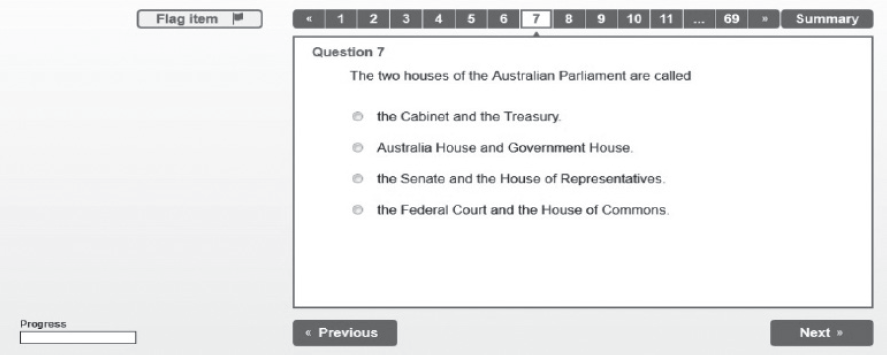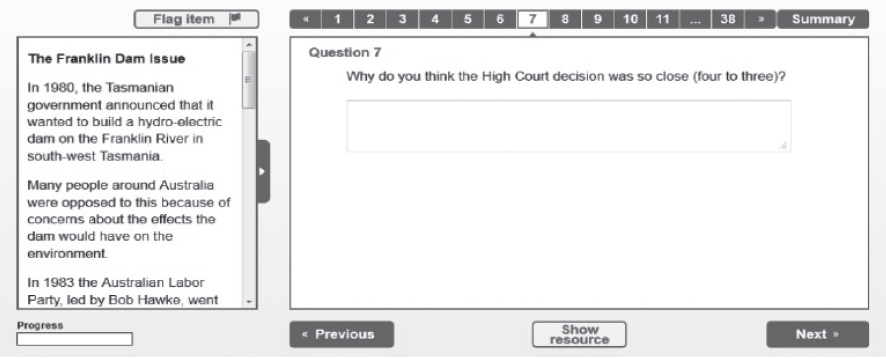Civic and citizenship knowledge supports democracy
Media release 26 Nov 2014 4 minute readThe percentage of Australian school students with the skills and knowledge required to be active and informed citizens has remained stable between 2010 and 2013, according to a report by the Australian Council for Educational Research (ACER) released today by the Australian Curriculum, Assessment and Reporting Authority (ACARA).
26 November 2014: The percentage of Australian school students with the skills and knowledge required to be active and informed citizens has remained stable between 2010 and 2013, according to a report by the Australian Council for Educational Research (ACER) released today by the Australian Curriculum, Assessment and Reporting Authority (ACARA).
The NAP - CC measures students' skills, knowledge and understandings of Australia’s system of government and civic life as well as their civic attitudes and values, and participation in civic-related activities. The report released today provides the results from a representative sample of more than 11 000 Year 6 and Year 10 students in the 2013 NAP - CC assessment cycle, the first NAP sample assessment to be delivered to students online.
NAP - CC identifies a 'challenging but reasonable' proficient standard for students in Years 6 and 10. Nationally, 52 per cent of Year 6 students reached or surpassed the Year 6 standard in 2013, and 44 per cent of Year 10 students reached or surpassed the Year 10 standard.
"While 46 per cent of Year 6 students could identify that the Governor-General represents the Queen in Australia, only 19 per cent of Year 10 students could identify that the Queen is Australia’s head of state, and only 39 per cent could recognise a definition of a trade union," said Julian Fraillon lead author of the report.
The overall results show considerable variation within and across states and territories. Year 6 students in the ACT, NSW and Victoria achieved higher on average, while Year 10 students from NSW, the ACT, Victoria and WA achieved higher on average.
Trends at the national level since 2010 reveal no significant change for either year level, and no significant change in the test performance of boys and girls, although Year 6 girls continue to outperform boys by 21 NAP - CC scale points, the equivalent of about six months of schooling, while Year 10 girls outperform boys by 14 scale points, the equivalent of about two months of schooling.
"Non-Indigenous students scored higher than Indigenous students by almost 100 scale points, the equivalent of four years of schooling, at each year level, while students in metropolitan schools had higher average test scores than those in remote schools, a respective difference of 94 points in Year 6 and 99 points in Year 10," Mr Fraillon said.
The report suggests that students from higher socioeconomic backgrounds achieve higher scores than students from lower socioeconomic backgrounds.
Responses to the attitudes and engagement questionnaire reveal:
- The level of trust in civic institutions expressed by students in Year 6 was higher in 2013 than in 2010.
- Girls expressed higher levels of trust in civic institutions than boys at both year levels.
- Although large majorities of students expressed positive attitudes towards Australian Indigenous cultures, Year 10 boys showed less positive attitudes than Year 6 boys, while girls in Year 10 expressed more positive attitudes than those in Year 6.
- While the percentage of Year 10 students reporting reading the newspaper decreased between 2010 and 2013, there was an increase in the percentage of students reporting using the internet for information and listening to radio news.
The example items below are extracted from the ‘National Assessment Program – Civics and Citizenship Years 6 & Year 10 Report 2013’ and are reproduced with the permission of ACARA.
Year 6 item

Year 10 item

The full report is available from < www.nap.edu.au >
****************ENDS*************
Media enquiries: Steve Holden, 03 9277 5582 or 0419 340 058 communications@acer.edu.au
